上海小学五年级第一学期英语介词
牛津英语上海五年级上册知识点重点单词句型(完整版)

M1U1第2页get to know you 了解你an ‘orange’ party 一个橘色派对come to my birthday party 来参加我的生日聚会on Sunday 在周日on the ninth of September = on September the ninth 在九月九号at two o’clock in the afternoon = at 2:00 p.m. 在下午两点bring or wear some orange things to the party 带或穿一些橘黄色的东西来参加聚会my favourite colour 我最喜欢的的颜色be moved 很感动的That sounds interesting/ funny. 听起来很有趣/滑稽。
I can’t wait. 我等不及了。
give sb a big surprise 给某人一个惊喜be surprised 很惊讶的第3页1. 单词:一月到十二月in January, February, March, April, May, June, July, August, September, October, November, December2. 序数词:第一到第三十一见书序数词前+the 例如:the first第4页at Peter’s birthday party 在Peter的生日聚会上 a pair of orange trousers 一条橘色裤子a picture of you /him/her 一张你的图片make your own(invitaion) 做你的请柬have some fun = have a good time = enjoy ourselves 玩得开心make a birthday invitation 做一张生日请柬invite sb to the party 邀请某人去聚会live in Room 301 住在301室live on Yongqing Road 住在永清路live at Room 301, Building 9, 58 Yongqing Road 住在永清路58号9号楼301室近义词(同义词):begin – start interesting – funny present – gift复数:party – parties Sunday – Sundays第5页Tommy’s birthday present Tommy的生日礼物be busy doing sth. 忙于做某事the next morning 第二天早上 a smart new hat 一顶漂亮的新帽子a hat maker 一个做帽子的人be tired of sweets 厌倦糖果be late for school 上学迟到反义词:come – go bring – take interesting – boring busy – free sad – happy late – early next – last new – old easy – hard / difficult第6页drill 钻孔least 最少at least 至少leave 离开leave home 离开家last but not least 最后但也是最重要的(用于作文最后一段)句型1. When does the first class begin? It begins at 8:30.(begin 是动词,不要与is连用,三单动词加“s”。
沪教版五上英语单元知识汇总

沪教版五上英语单元知识汇总以下是沪教版五年级上册英语各单元的知识汇总:Unit 1 My Future单词:•future(将来,未来)•want(想要)•pilot(飞行员)•teach(教)•cook(厨师,烹饪)•taxi driver(出租车司机)•job(工作)•singer(歌手)•fall/drop(掉落)•lifeguard(救生员)•save(救助,节约)•become(变成,变得)•短语:••fly a plane(驾驶飞机)•in the sky(在空中)•help people(帮助人们)•teach English(教英语)•in a school(在一所学校)•cook nice/delicious food(做美味的食物)•be afraid of+动词ing(害怕……)•be good at+动词ing(擅长……)•fall/jump into the lake(掉入/跳入湖中)•want to+动词原形(想要做某事)•句型:••What do you want to be? I want to be a/an+职业.•What does he/she want to be? He/She wants to be a/an+职业.•Do you want to be a/an+职业? Yes, I do./No, I don’t.•Does he/she want to be a/an+职业? Yes, he/she does. No, he/she doesn’t.Unit 2 Going to School•单词:••by(表示方式)•walk(步行)•Ms(女士)•journey(旅程)•primary school(小学)•underground(地铁)•station(车站)•take(乘坐,带领)•after(在……之后)•hour(小时)•短语:••by bus(乘公交车)•by car(乘小汽车)•by bike(骑车)•on foot(步行)•far from(离……远)•walk to school(步行去学校)•journey to work(上班旅程)•at Happy Primary School(在开心小学)•on Green Street(在格林大街)•an underground station(一个地铁站)•take the train(乘火车)•get off the train(下火车)•at Park Street Station(在公园街站)•take Bus No.12(乘12路公交)•at Spring Street Bus Stop(在春街公交站)•after an hour(在一小时后)•句型:••How do you come to school? I come to school+介词短语. •How does he/she go to school? He/She goes to school+介词短语.•I live far from/near school.Unit 3 My Birthday•••party(聚会)•when(什么时候)•begin(开始)•bring(带来)•thing(东西,事物)•favourite(最喜欢的)•interesting(有趣的)•hat(帽子)•短语:••birthday party(生日聚会)•some orange things(一些橙色东西)•an orange party(一次橙色聚会)•That sounds interesting.(那听起来很有趣)•I can’t wait!(我等不及了)•Happy birthday!(生日快乐)•••Can you come to my birthday party? Sure.•When’s your birthday? It’s on+具体日期.•What time does the party begin? It begins at+具体时间.。
沪教版五年级英语 Module 1复习 介词in,on,at的常见用法

第二课时Review of Module 1 &介词in, on, at 的常见用法Part 1 Review of Module 1I. 句型1.-When is your birthday?-It’s on the 19th of September.2.-When does the party begin?-It’s begins at two o’clock in the afternoon.3.-What time do you leave home?-I leave home at about a quarter to eight.4.-How do you come to school? -I come school on foot. / I walk to school.5. I go to work by bus/ taxi/ underground. =I take a bus/taxi/an underground to work.6. Ben always rides his bike to school. =Ben always goes to school by bike.7.-Where do you cross the road? –We cross the road at traffic lights or at zebra crossings.8. The old man crosses the road slowly. = The old man goes across the road slowly.9. What do you want to be in the future? – I want to be a teacher.10. What do you want to do in the future? – I want to give lessons to students.11. What’s your dream job? – I want to be a pilot.12. What does your father do? = What is your father’s job? = What is your father?II.动词转换成名词的规则1.词尾+er . 如worker, teacher, waiter ,runner等。
五年级英语介词at,on,in的使用

15. I was born __in____ 2008. 16. We will go to the library to read books _o_n __ Friday afternoon. 17. Tree Planting Day is __in___ March. 18. China’s National Holiday is __o_n___ October, 1st. 19. Robin met the ant again __o_n ___ a rainy morning. 20. He was born __on_____ a windy Friday.
介 词 at in on
介词at/in/on
in年in月in四季,in早in晚in下午,
on周on日on具体
at后加几点,还有noon /night
介词in
• in年in月in四季,in早in晚in下午 in+月、季节、年 例: in March in spring in 2022 in the + 一天的三部分 例: in the morning/ afternoon / evening
7. She works _a_t___ night. 8. Her birthday is __on____ May 5th. 9. We often play games and dance __o_n___ Children’s Day. 10. He often has lunch __a_t ___ 1:00 p.m. 11. What do you often do __on____ Christmas Day? 12. I often go swimming __o_n ____ Saturdays. 13. I often take a nap __at___ noon. 14. What are you going to do ___in___ the evening?
上海牛津英语 五年级上册语法点整理
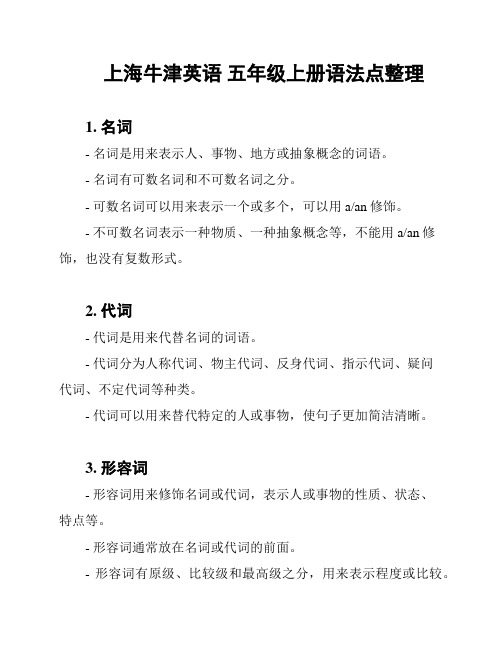
上海牛津英语五年级上册语法点整理1. 名词- 名词是用来表示人、事物、地方或抽象概念的词语。
- 名词有可数名词和不可数名词之分。
- 可数名词可以用来表示一个或多个,可以用a/an修饰。
- 不可数名词表示一种物质、一种抽象概念等,不能用a/an修饰,也没有复数形式。
2. 代词- 代词是用来代替名词的词语。
- 代词分为人称代词、物主代词、反身代词、指示代词、疑问代词、不定代词等种类。
- 代词可以用来替代特定的人或事物,使句子更加简洁清晰。
3. 形容词- 形容词用来修饰名词或代词,表示人或事物的性质、状态、特点等。
- 形容词通常放在名词或代词的前面。
- 形容词有原级、比较级和最高级之分,用来表示程度或比较。
4. 动词- 动词用来表示一个人或事物的动作、状态、存在等。
- 动词分为及物动词和不及物动词。
- 及物动词需要接宾语,不及物动词不需要接宾语。
- 动词的时态有过去时、现在时和将来时等。
5. 副词- 副词用来修饰动词、形容词、副词或整个句子,表示时间、地点、程度等。
- 副词通常放在要修饰的词语之前或之后。
6. 介词- 介词用来表示人或事物之间的关系。
- 介词通常与名词或代词连用,构成介词短语。
- 常见的介词有in、on、at、under等。
7. 冠词- 冠词用来表示名词的特指与泛指。
- 英语中的冠词分为定冠词和不定冠词。
- 定冠词the表示特指,不定冠词a/an表示泛指。
8. 句子- 句子是由主语和谓语构成的完整表达意思的语言单位。
- 句子分为陈述句、疑问句、祈使句和感叹句等种类。
- 句子根据结构可以分为简单句、并列句和复合句。
9. 从句- 从句是句子中的一部分,不能独立成句。
- 从句通常由连词引导,与主句之间存在一定的关系。
- 常见的从句有名词性从句、定语从句和状语从句等。
10. 时态- 时态用来表示动作发生的时间。
- 常见的时态有一般现在时、一般过去时、一般将来时等。
- 时态的使用与句子的主语和谓语的时态有关。
沪教牛津版五年级英语上册全册知识点汇总
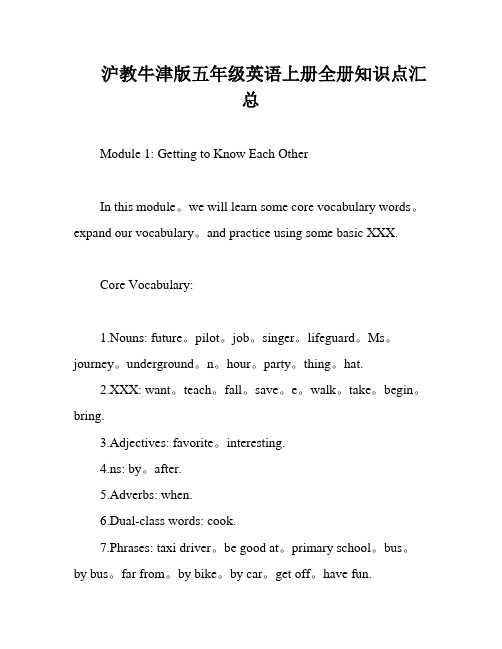
沪教牛津版五年级英语上册全册知识点汇总Module 1: Getting to Know Each OtherIn this module。
we will learn some core vocabulary words。
expand our vocabulary。
and practice using some basic XXX.Core Vocabulary:1.Nouns: future。
pilot。
job。
singer。
lifeguard。
Ms。
journey。
underground。
n。
hour。
party。
thing。
hat.2.XXX: want。
teach。
fall。
save。
e。
walk。
take。
begin。
bring.3.Adjectives: favorite。
interesting.4.ns: by。
after.5.Adverbs: when.6.Dual-class words: cook.7.Phrases: taxi driver。
be good at。
primary school。
bus。
by bus。
far from。
by bike。
by car。
get off。
have fun.XXX Vocabulary:1.Nouns: doctor。
XXX。
sky。
subject.2.Months: January。
February。
March。
April。
May。
June。
July。
August。
September。
October。
XXX。
XXX.3.XXX: help.4.Phrases: fly a plane。
be afraid of.XXX Structures:1."What do you want to be?" - "I want to be a pilot." (Asking XXX.)2."What do you want to be?" - "I want to be a XXX." (Asking XXX.)In this module。
“牛津上海版”小学英语五年级(上)知识点大全

语法
1. 特 殊 疑 问 句 What do you want to be? 2.动词 want want to be sb. I want to be a pilot. want sth. I want a hamburger. want to do sth. I want to fly. 3. 一 般 现 在 时 例 Peter wants to be a pilot.
核心词汇
1.taxi 出租车 2.underground 地铁 3.zebra crossing 斑马线 4.traffic lights 红绿灯 5.pavement 人行道 6.live 住 7.leave 离开 8.on foot 步行 9.arrive 到达
10.cross 横过
词组
词汇辨析 句子
1.at Peter’s birthday party 在 Peter 的生日聚会上 2.on the 19th of September 在 9 月 19 日 3.on Sunday 在周日 4.at two o’clock 在两点 5.in the afternoon 在下午 6.at night 在晚上 7.sb.be tired 某人很累 8.my favourite color 我最喜欢的颜色 9.That sounds interesting.那听上去有趣。 10.I can’t wait!我等不及了! 11.Happy Birthday!生日快乐! 12.Welcome to my party.欢迎来我的派对。 13.a pair of orange trousers 一条橙色的裤子 14.make a birthday invitation 制作一张生日请帖 15.make a hat 制作一顶帽子 16.have some fun 过得高兴 17.birthday present 生日礼物
【沪教】五上英语知识点总结

【沪教版】五年级(上册)英语:知识点总结Module 1Getting to know each other一、核心词汇1.名词:future 将来;未来pilot 飞行员job 工作;职业singer 歌手lifeguard 救生员Ms 女士journey旅程;旅行underground地铁station 车站hour 小时party 聚会thing 东西;事物hat 帽子2.动词:want 想要teach 教(课)fall 掉落;落下save 救;救助;节约become 变成;变得walk 走;步行take 乘坐(交通工具);带领begin 开始bring 带来3.形容词:favorite 最喜欢的interesting 有趣的4.介词:by(表示方式);靠近after 在……后5.副词:when 什么时候6.兼类词:cook 厨师;烹饪7.短语:taxi driver 出租车司机(be) good at 擅长primary school 小学bus stop 公共汽车站by bus 乘公共汽车far from 离……远on foot 步行by bike 骑自行车by car 乘小汽车get off 下车have fun 尽情玩二、拓展词汇1.名词:doctor 医生teacher 老师sky 天空subject 科目2.月份名词:January (Jan.) 一月February(Feb.) 二月March(Mar.) 三月April(Apr.) 四月May 五月June(Jun.) 六月July(Jul.)七月August(Aug.) 八月September(Sept.) 九月October(Oct.) 十月November(Nov.) 十一月December(Dec.) 十二月3.动词:help 帮助4.短语:fly a plane 驾驶飞机be afraid of 害怕三、核心句型1.—What do you want to be? 你想要成为什么?—I want to be a pilot. 我想要成为一名飞行员。
五年级上册英语介词表

五年级上册英语介词表介词概述介词是英语语法中的一部分,常用于连接名词、代词或动词与其他部分的词汇。
在句子中,介词通常用来表达位置、时间、方式、原因等关系。
以下是五年级上册英语中常用的介词及其用法。
位置介词- 在(in)- 用于表示在某个范围、建筑物或地方内- 例如:在学校、在书包里- 在...上(on)- 用于表示物体或表面上的位置- 例如:在桌子上、在墙上- 在...下(under)- 用于表示物体或表面下面的位置- 例如:在椅子下、在桌子下面- 在...旁边(beside)- 用于表示在某物旁边- 例如:在门旁边、在树旁边方式介词- 用(by)- 用于表示通过某种方式或工具- 例如:用手、用车- 用(with)- 用于表示使用某种工具或带有某种特征的事物- 例如:用铅笔、用手机- 通过(through)- 用于表示穿过某个物体或通过某个区域- 例如:通过门、通过森林时间介词- 在...前(before)- 用于表示某个事件或时间点之前- 例如:在午饭前、在星期一前- 在...后(after)- 用于表示某个事件或时间点之后- 例如:在课后、在晚饭后- 在...期间(during)- 用于表示某个时间段内- 例如:在假期期间、在活动期间原因介词- 为了(for)- 用于表示某个目的或目标- 例如:为了研究、为了娱乐- 因为(because of)- 用于表示某个原因或理由- 例如:因为雨、因为生病以上是五年级上册英语常用的介词及其用法。
请同学们多加练,掌握介词在不同语境中的正确使用。
注:此表格仅供参考,具体用法还需根据上下文判断。
五年级方位介词英语

五年级方位介词英语一、基础知识方位介词是指用来描述人或物在空间中位置关系的介词。
在英语中,常用的方位介词有:in、on、at、above、below、under、beside 等。
二、使用规则1. in:用于描述物体在某个范围内,表示在某个封闭的空间或区域之内。
- The book is in the drawer.(书在抽屉里。
)- Jane is in the classroom.(简在教室里。
)2. on:用于描述物体在某个表面上,表示在某个平面之上。
- The cup is on the table.(杯子在桌子上。
)- The cat is on the roof.(猫在屋顶上。
)3. at:用于表示具体的位置或地点。
- Tom is at the park.(汤姆在公园。
)- The party is at John's house.(派对在约翰家。
)4. above:用于描述物体在另一个物体或位置之上。
- The bird is flying above the tree.(鸟在树的上方飞翔。
)- The stars are above us.(星星在我们的上方。
)5. below:用于描述物体在另一个物体或位置之下。
- The fish is swimming below the water.(鱼在水下游泳。
)- The ground is below our feet.(地面在我们脚下。
)6. under:用于描述物体在另一个物体的下面,表示在某个物体的底部。
- The cat is hiding under the bed.(猫躲在床下。
)- The ball rolled under the table.(球滚到桌子底下。
)7. beside:用于描述物体在另一个物体的旁边。
- The dog is sitting beside the boy.(狗坐在男孩旁边。
)- The car is parked beside the building.(车停在建筑物旁边。
沪教版五年级英语 Module 1复习 介词in,on,at的常见用法

沪教版五年级英语 Module 1复习介词in,on,at的常见用法沪教版五年级英语module1复习介词in,on,at的常见用法第二课复习模块1&介词in、on、at的常用用法part1reviewofmodule1i.句型1.-你什么时候过生日?-9月19日。
5.igotoworkbybus/taxi/underground.=itakeabus/taxi/anundergroundtowork.6.benalw aysrideshisbiketoschool.=benalwaysgoestoschoolbybike.7.你在哪过马路?C穿过道路属性灯或斑马线。
8.theoldmancrossestheroadslowly.=theoldmangoesacrosstheroadslowly.9.whatdoyouw anttobeinthefuture?ciwanttobeateacher.10.你将来想做什么?Ciwant给学生们上课。
11.你的梦想工作是什么?Ciwanttobeaplot。
12.whatdoesyourfatherdo?=whatisyourfather’sjob?=whatisyourfather?ii.动词转换成名词的规则1.后缀+ER,如工人、老师、服务员、跑步者等。
以E结尾的+R,例如驾驶员、潜水员、舞者等。
后缀+或如演员、水手、编辑等。
结尾+ress(女性)。
例如女演员、女服务员等。
5.词尾+ist(成名成家)。
如pianist,violinist,artist,cartoonist等。
介词in、on和at的常用表示时间●at表示时间的一个点在……的开始,午夜八点钟…。
atchristmasatnewyear● in表示时间更长eg.infebruaryinsummerintwoweeksinfiveminutes晚上/中午之后● on表示一个特定的日期eg.onsundayonthe14thofjuneonchristmasday昨天星期五晚上的星期四2.表示地点● 地点较小的地方eg.atthebusstopatthedooratthetopofmountainattheendofthestreet●in表地点在里面或在一个比较大的地方在海上的城市● 桌上的地方指的是面对面的接触eg.onthedeskontheflooronthewallonthegrassonthebicycle课堂练习1.用所给单词的正确形式填空1)let(he)dohishomework.2)天空中有一些云。
小学五年级英语上册第四单元小结(沪教版)
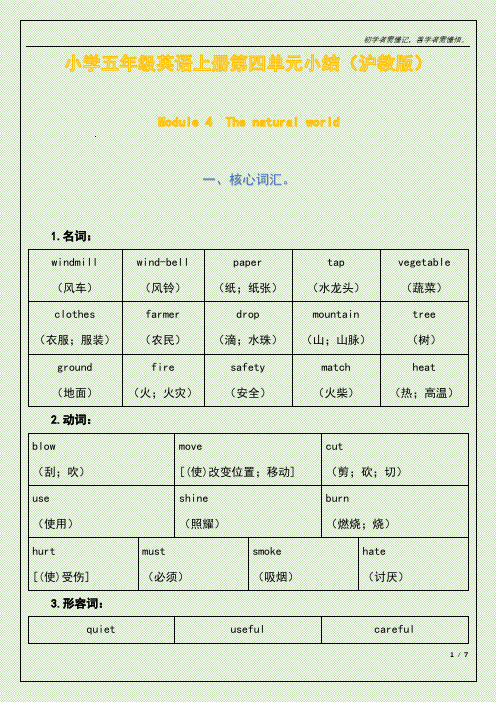
1.名词:windmill (风车)wind-bell(风铃)paper(纸;纸张)tap(水龙头)vegetable(蔬菜)clothes (衣服;服装)farmer(农民)drop(滴;水珠)mountain(山;山脉)tree(树)ground (地面)fire(火;火灾)safety(安全)match(火柴)heat(热;高温)2.动词:blow (刮;吹)move[(使)改变位置;移动]cut(剪;砍;切)use (使用)shine(照耀)burn(燃烧;烧)hurt [(使)受伤] must(必须)smoke(吸烟)hate(讨厌)3.形容词:quiet useful careful一、核心词汇。
(轻声的;安静的)(有用的)(小心的)4.副词:gently(和缓地;温柔地)softly(轻柔地)strongly(强劲地)happily (快乐地)slowly(缓慢地)quickly(快地;迅速地)5.介词:up(向上;在上面)over(在……上方)inside(在……里面)6.兼类词:sound[(名词)声音;(动词)听起来好像] 7.短语:grow crops (种庄稼)put out fires(灭火)burn down(烧毁)(be) careful with (当心……)not … at all (一点也不……)1.名词:children(孩子们)2.动词:二、拓展词汇。
taste(尝起来)3.短语:the journey of …(……的旅行)on the fire (在火上)1.The children are flying their kites happily. (孩子们正在快乐地放风筝。
)解读:这是描述某事物程度或者状态的句型。
举一反三:They are drinking milk happily.(他们正在快乐地喝牛奶。
)2.—How do we use water?(我们怎样使用水呢?)—We use water to wash our hands.(我们用水洗手。
小学英语(牛津上海版)五年级上册知识点汇总

五年级上册英语知识点汇总:时间的读法:1.直接读法:小时分钟2.整点读法:小时o’clock3.半点读法:half past小时4.半点以内读法:分钟past小时·5.超过半点读法:差几分to下个小时6.含一刻钟读法:a quarter past小时(几点15分)a quarter to下个小时(几点45分)在几点(几分)用介词at相关词汇:基数词o’clock half quarter past to日期的表示:1.月份:January February March April May June July August SeptemberOctober November December对应的缩写:Jan.Feb.Mar.Apr.May.Jun.Jul.Aug.Sep.Oct.Nov.Dec.在几月用介词in,在几月几日,某天(的早中晚)用介词on2.日期:序数词:1~10:first second third fourth fifth sixth seventheighth ninth tenth11~20:eleventh twelfth thirteenth fourteenthfifteenth sixteenth seventeenth eighteenthnineteenth twentieth整十的序数词:变y为ie+th几十几的序数词:几十用基数词-个位用序数词例:21→twenty-first对应的缩写:1st2nd3rd其余的直接数字+th3.几月几日的表示:the日期of月份例:12月28日→the twenty-eighth of December月份日期例:12月28日→December twenty-eighth4.疑问代词When和What time的区别:When What time 询问做某事的时间√√(具体时间)询问年份,月份,日期√√询问现在几点(钟表时间)××乘坐交通工具的两种表达方式:take:take用作动词,表示乘、坐某一交通工具,且在表示该交通工具的名词前一般应有冠词等修饰词。
五年级上册英语同步拓展M1 Unit 3 My future 介词复习 牛津上海版(一起)
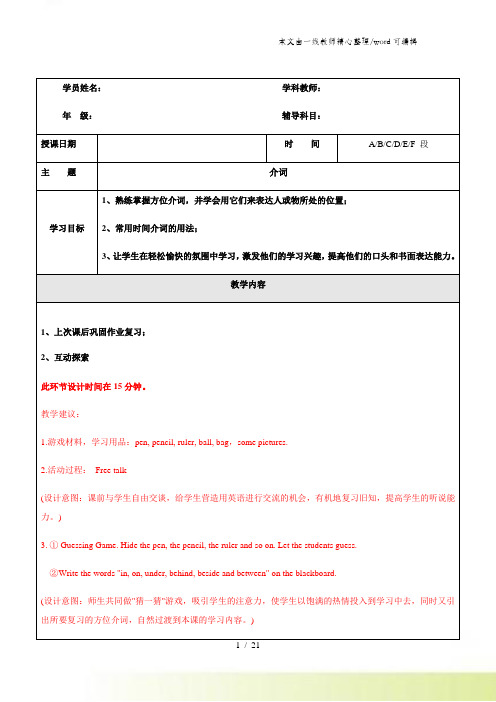
学员姓名:学科教师:年级:辅导科目:授课日期时间A/B/C/D/E/F 段主题介词学习目标1、熟练掌握方位介词,并学会用它们来表达人或物所处的位置;2、常用时间介词的用法;3、让学生在轻松愉快的氛围中学习,激发他们的学习兴趣,提高他们的口头和书面表达能力。
教学内容1、上次课后巩固作业复习;2、互动探索此环节设计时间在15分钟。
教学建议:1.游戏材料,学习用品:pen, pencil, ruler, ball, bag,some pictures.2.活动过程:Free talk(设计意图:课前与学生自由交谈,给学生营造用英语进行交流的机会,有机地复习旧知,提高学生的听说能力。
)3. ① Guessing Game. Hide the pen, the pencil, the ruler and so on. Let the students guess.②Write the words "in, on, under, behind, beside and between" on the blackboard.(设计意图:师生共同做"猜一猜"游戏,吸引学生的注意力,使学生以饱满的热情投入到学习中去,同时又引出所要复习的方位介词,自然过渡到本课的学习内容。
)猜一猜:这些东西被老师放在哪里呢?此环节教案预期时间60分钟。
教学建议:1、在教学过程中让学生多去用介词造句。
2、通过图片让学生对介词能有更直观的感受。
3、让小组的学生根据教室周围的环境用介词来描述。
【知识梳理1】方位介词1. 表示地点的介词:at, in, on, under, near, between, around, behind, in front of1) at在某地(表示比较狭窄的场所)如:at home在家at the bus stop在公共汽车站at the station在火车站I’ll meet him at the Beijing railway station.我将去北京站接他。
沪教版英语五年级上册介词
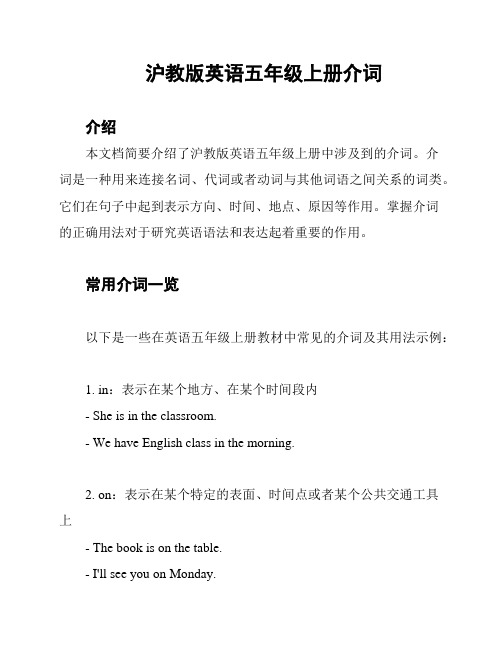
沪教版英语五年级上册介词介绍本文档简要介绍了沪教版英语五年级上册中涉及到的介词。
介词是一种用来连接名词、代词或者动词与其他词语之间关系的词类。
它们在句子中起到表示方向、时间、地点、原因等作用。
掌握介词的正确用法对于研究英语语法和表达起着重要的作用。
常用介词一览以下是一些在英语五年级上册教材中常见的介词及其用法示例:1. in:表示在某个地方、在某个时间段内- She is in the classroom.- We have English class in the morning.2. on:表示在某个特定的表面、时间点或者某个公共交通工具上- The book is on the table.- I'll see you on Monday.- She is on the bus.3. at:表示在某个具体位置、时间点或者事件上- He is at home.- The party starts at 6 o'clock.- I met her at the park.4. to:表示朝向、方向或者目的地- We are going to the park.- He is running to the store.5. by:表示通过某种方式或者交通工具- She goes to school by bus.- You can contact me by email.6. with:表示陪伴、使用或者和某人一起- She is playing with her friends.- He writes with a pen.7. from:表示起始点或者来源- The book is from the library.- I am from China.8. for:表示目的、用途或者对象- She bought flowers for her mother.- I made this gift for you.结论这些介词在英语表达中扮演着重要的角色。
小学五年级英语上册第一单元小结(沪教版)

1.名词:future (将来;未来)pilot(飞行员)job(工作;职业)singer(歌手)lifeguard (救生员)Ms(女士)journey(旅程;旅行)underground(地铁)station (车站)hour(小时)party(聚会)thing(东西;事物)hat(帽子)2.动词:want (想要)teach[教(课)]fall(掉落;落下)save (救;救助;节约)become(变成;变得)walk(走;步行)take[乘坐(交通工具);带领]begin(开始)bring(带来)3.形容词:favorite interesting一、核心词汇。
(最喜欢的)(有趣的)4.介词:by[(表示方式);靠近]after (在……后)5.副词:when(什么时候)6.兼类词:cook(厨师;烹饪)7.短语:taxi driver (出租车司机)(be) good at(擅长)primary school(小学)bus stop (公共汽车站)by bus(乘公共汽车)far from(离……远)on foot (步行)by bike(骑自行车)by car(乘小汽车)get off(下车)have fun(尽情玩)1.名词:doctor (医生)teacher(老师)sky(天空)subject(科目)2.月份名词:二、拓展词汇。
January (Jan.) (一月)February (Feb.)(二月)March (Mar.)(三月)April (Apr.)(四月)May (五月)June (Jun.)(六月)July (Jul.)(七月)August (Aug.)(八月)September (Sept.)(九月)October (Oct.)(十月)November (Nov.)(十一月)December (Dec.)(十二月)3.动词:help(帮助)4.短语:fly a plane (驾驶飞机)be afraid of (害怕)1.—What do you want to be?(你想要成为什么?)—I want to be a pilot.(我想要成为一名飞行员。
